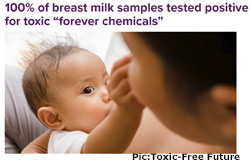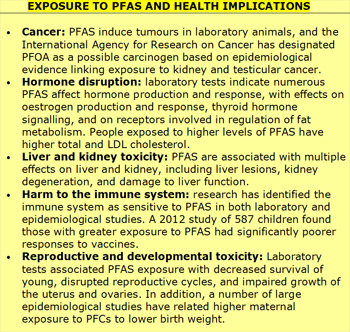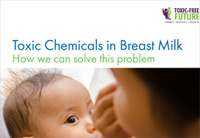* This carcinogen is used in food packaging, plastic bottles, clothing, and other products, but national regulation in the UK lags behind those of Europe and some States in the USA.
* There is NO routine testing for PFAS and other cancer causing chemicals in drinking water in the UK!
* Food packaging used by Burger King, McDonalds, and many others like KFC in the UK and in the US contain PFAS which does NOT remain in the packaging and can leach out into the food it contains.
* All PFAS build up in the human body
Cancer causing chemicals, known as PFAS (per- and polyfluorinated substances), have been found in human breast milk in the USA, according to the findings of a recent scientific study published today.
 Scientific evidence shows that breastfeeding is healthiest for babies and mothers. Breastfed babies have fewer infections and reduced risk of asthma, obesity, diabetes, and other health problems.
Breast feeding can also improve mothers’ health, reducing risk of high blood pressure, diabetes, breast cancer, and other health problems.
Scientific evidence shows that breastfeeding is healthiest for babies and mothers. Breastfed babies have fewer infections and reduced risk of asthma, obesity, diabetes, and other health problems.
Breast feeding can also improve mothers’ health, reducing risk of high blood pressure, diabetes, breast cancer, and other health problems.
But now this is being put at risk as a new study in the US has found that chemical industry claims that the newer forms of PFAS' manufactured do not build up in people’s bodies is false!
The situation in the UK is unknown because our government environmental and public health agencies doe not test drinking water at all for carcinogenic chemicals, let alone for PFAS.
However, given that the food industry in the UK is no different from that in the USA with packaging containing PFAS being in use here, as well as in everyday products and furnishings.
These PFAS chemicals have been linked to a wide range of health problems including a weaker immune system, cancer, increased cholesterol levels, pregnancy-induced hypertension, liver damage, reduced fertility, and increased risk of thyroid disease.
The latest study in the USA published today in Environmental Science & Technology found toxic chemicals in 100% of breast milk samples tested.
Scientists from Toxic-Free Future, Indiana University, the University of Washington, and Seattle Children’s Research Institute led the research.
Their findings show that toxic PFAS (per- and polyfluorinated substances)—including new generation compounds currently in use—build up in people.
 Despite chemical industry assurances that current-use PFAS do not build up in people, and that short-chain PFAAs are less frequently detected in water/sediment and are not detected in wildlife; this study finds detections of these chemicals in breast milk to be on the rise globally and doubling every four years.
Despite chemical industry assurances that current-use PFAS do not build up in people, and that short-chain PFAAs are less frequently detected in water/sediment and are not detected in wildlife; this study finds detections of these chemicals in breast milk to be on the rise globally and doubling every four years.
Previous reports have confirmed that companies put PFAS chemicals in a wide range of everyday products, from food packaging and clothing to carpet and upholstery
This study, the first since 2005 to analyze PFAS in breast milk from mothers in the United States, found that 50 out of 50 women tested positive for PFAS, with levels ranging from 52 parts per trillion (ppt) to more than 500 ppt.
Breast milk samples were tested for 39 different PFAS, including 9 current-use compounds. Results found that both current-use and phased-out PFAS contaminate breast milk, exposing nursing infants to the effects of toxic chemicals.
A total of 16 PFAS were detected with 12 found in more than 50% of the samples. The levels of PFAS that are currently in use in a wide range of products are rising in breast milk.
Toxic-Free Future science director and study co-author Erika Schreder said:
“We now know that babies, along with nature’s perfect food, are getting toxic PFAS that can affect their immune systems and metabolism. We shouldn’t be finding any PFAS in breast milk and our findings make it clear that broader phase outs are needed to protect babies and young children during the most vulnerable stages of life.”
She added that mothers work hard to protect their babies, but big corporations are putting these, and other toxic chemicals that can contaminate breast milk, in products when safer options are available.
Dr. Amina Salamova, study co-author and associate research scientist at Indiana University, said:
 “These findings make it clear that the switch to newer PFAS over the last decade didn’t solve the problem.
“These findings make it clear that the switch to newer PFAS over the last decade didn’t solve the problem.
This study provides more evidence that current-use PFAS are building up in people. What this means is that we need to address the entire class of PFAS chemicals, not just legacy-use variations.”
Chemical companies make PFAS chemicals for their stain-resistant, water-repellent, and grease-proof properties.
PFAS have a vast array of uses in consumer products such as food packaging, clothing, furniture, carpets, paints and are used in a range of industrial processes for their stain-resistant, water-repellent, and grease-proof properties.
A growing body of scientific research has found links between exposures to PFAS and a wide range of health problems including a weaker immune system, cancer, increased cholesterol levels, pregnancy-induced hypertension, liver damage, reduced fertility, and increased risk of thyroid disease. Scientists are most concerned about the cumulative impact resulting from exposures to products, contaminated drinking water, and contaminated food.
Dr. Sheela Sathyanarayana, study co-author and associate professor of pediatrics at the University of Washington and Seattle Children’s Research Institute, explained:
“Exposures to PFAS can weaken our immune system, making a person more vulnerable to infectious diseases. It is especially concerning to see exposures happening through bioaccumulation in breast milk, which then exposes a nursing child during a critical period of development.”
“If a harmful chemical can end up in breast milk due to its persistence or ability to bioaccumulate, it should be prohibited in everyday products we are constantly exposed to,” said Laurie Valeriano, executive director of Toxic-Free Future.
Back in the UK, ENDS Reports website quotes Dr Cecilia Macleod from the University of Greenwich, who is researching PFAS contamination in the UK, as saying that breast milk is an important source of PFAs to infants and young children.
"A recent study by Zheng et al (June 2021) found total or sum of PFAS concentrations in breast milk to range between 52ng/l to 1850ng/l these concentrations are significantly higher than the drinking water screening levels set by a number of US states which are set between 8 to 70 ng/l for the longer chain PFAS compounds including PFOS, PFOA, PFNA, PFHxS, PFHpa and PFDa," she said.
 "The median concentration of 121ng/l is significantly higher that the drinking water screening value indicating that infants may be exposed to potentially harmful concentrations of these compounds in breast milk.
"The median concentration of 121ng/l is significantly higher that the drinking water screening value indicating that infants may be exposed to potentially harmful concentrations of these compounds in breast milk.
No similar studies have been in undertaken in the UK where the PFAS drinking water health advisory levels are set at 100 ng/l for wholesomeness where a requirement to reduce the concentration to below 100 ng/l in water exists."
Despite the Environment Agency saying that PFAS is “ubiquitous in the environment”, there is no systematic testing of drinking water in the uk to see whether it is contaminated, as has been found in the US, Australia and a number of European countries.
 In the US, some food retailers have taken actions that help reduce exposure to PFAS and demonstrate that alternatives are feasible.
In the US, some food retailers have taken actions that help reduce exposure to PFAS and demonstrate that alternatives are feasible.
Yet, in the UK, the public seem to be totally unaware of the danger these chemicals pose to the development of their children, and the risk of them developing cancers, not only in later life, but during their period of growth too.
Toxic-Free Future’s factsheet, Toxic Chemicals in Breast Milk, outlines the study’s findings and provides detailed actions that can be taken to help solve the toxic PFAS problem.
This health risk to children and adults alike, is universal and not just a US based problem.
Source: Toxic-Free Future press release / ENDS Report / Flouro Council / wionews / unionsafety


 Scientific evidence shows that breastfeeding is healthiest for babies and mothers. Breastfed babies have fewer infections and reduced risk of asthma, obesity, diabetes, and other health problems.
Breast feeding can also improve mothers’ health, reducing risk of high blood pressure, diabetes, breast cancer, and other health problems.
Scientific evidence shows that breastfeeding is healthiest for babies and mothers. Breastfed babies have fewer infections and reduced risk of asthma, obesity, diabetes, and other health problems.
Breast feeding can also improve mothers’ health, reducing risk of high blood pressure, diabetes, breast cancer, and other health problems. Despite chemical industry
Despite chemical industry  “These findings make it clear that the switch to newer PFAS over the last decade didn’t solve the problem.
“These findings make it clear that the switch to newer PFAS over the last decade didn’t solve the problem. "The median concentration of 121ng/l is significantly higher that the drinking water screening value indicating that infants may be exposed to potentially harmful concentrations of these compounds in breast milk.
"The median concentration of 121ng/l is significantly higher that the drinking water screening value indicating that infants may be exposed to potentially harmful concentrations of these compounds in breast milk. 